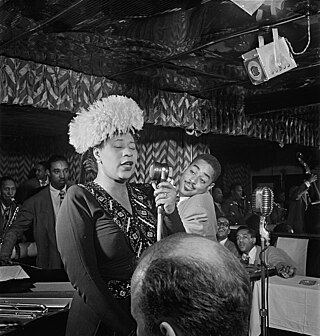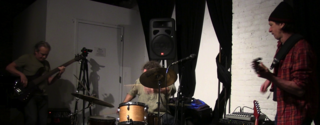Miguel Frasconi (born May 29, 1956 in New York City) is an American composer who often uses improvisation, electronics, and experimental musical instruments.
Miguel Frasconi (born May 29, 1956 in New York City) is an American composer who often uses improvisation, electronics, and experimental musical instruments.
He has used new glass instruments, [1] and was a founding member of The Glass Orchestra from 1977 to 1986.
He has also worked with John Cage, Jon Hassell, Paul Dresher, John Oswald, and, since 2004, Morton Subotnick.
In 1979, he received his B.F.A. from York University, Toronto, where he studied composition with James Tenney, electronic music with Richard Teitelbaum and David Rosenboom, improvisation with Casey Sokol, and Carnatic music with Jon B. Higgins and Trichy Sankaran.

Originating in vocal jazz, scat singing or scatting is vocal improvisation with wordless vocables, nonsense syllables or without words at all. In scat singing, the singer improvises melodies and rhythms using the voice solely as an instrument rather than a speaking medium. This is different from vocalese, which uses recognizable lyrics that are sung to pre-existing instrumental solos.

A jazz band is a musical ensemble that plays jazz music. Jazz bands vary in the quantity of its members and the style of jazz that they play but it is common to find a jazz band made up of a rhythm section and a horn section.
Improvisation, often shortened to improv, is the activity of making or doing something not planned beforehand, using whatever can be found. The origin of the word itself is in the Latin "improvisus", which literally means un-foreseen. Improvisation in the performing arts is a very spontaneous performance without specific or scripted preparation. The skills of improvisation can apply to many different faculties across all artistic, scientific, physical, cognitive, academic, and non-academic disciplines; see Applied improvisation.

La Monte Thornton Young is an American composer, musician, and performance artist recognized as one of the first American minimalist composers and a central figure in Fluxus and post-war avant-garde music. He is best known for his exploration of sustained tones, beginning with his 1958 composition Trio for Strings. His compositions have called into question the nature and definition of music, most prominently in the text scores of his Compositions 1960. While few of his recordings remain in print, his work has inspired prominent musicians across various genres, including avant-garde, rock, and ambient music.
Free jazz, or free form in the early to mid-1970s, is a style of avant-garde jazz or an experimental approach to jazz improvisation that developed in the late 1950s and early 1960s, when musicians attempted to change or break down jazz conventions, such as regular tempos, tones, and chord changes. Musicians during this period believed that the bebop and modal jazz that had been played before them was too limiting, and became preoccupied with creating something new. The term "free jazz" was drawn from the 1960 Ornette Coleman recording Free Jazz: A Collective Improvisation. Europeans tend to favor the term "free improvisation". Others have used "modern jazz", "creative music", and "art music".

Vocal music is a type of singing performed by one or more singers, either with instrumental accompaniment, or without instrumental accompaniment, in which singing provides the main focus of the piece. Music which employs singing but does not feature it prominently is generally considered to be instrumental music as is music without singing. Music without any non-vocal instrumental accompaniment is referred to as a cappella.

Louis Thomas Hardin, known professionally as Moondog, was an American composer, musician, performer, music theoretician, poet and inventor of musical instruments. Largely self-taught as a composer, his prolific work widely drew inspiration from jazz, classical, Native American music which he had become familiar with as a child, and Latin American music. His strongly rhythmic, contrapuntal pieces and arrangements later influenced composers of minimal music, in particular American composers Steve Reich and Philip Glass.

Jeremy Webster "Fred" Frith is an English multi-instrumentalist, composer, and improviser. Probably best known for his guitar work, Frith first came to attention as a founding member of the English avant-rock group Henry Cow. He was also a member of the groups Art Bears, Massacre, and Skeleton Crew. He has collaborated with a number of prominent musicians, including Robert Wyatt, Derek Bailey, the Residents, Lol Coxhill, John Zorn, Brian Eno, Mike Patton, Lars Hollmer, Bill Laswell, Iva Bittová, Jad Fair, Kramer, the ARTE Quartett, and Bob Ostertag. He has also composed several long works, including Traffic Continues and Freedom in Fragments. Frith produces most of his own music, and has also produced many albums by other musicians, including Curlew, the Muffins, Etron Fou Leloublan, and Orthotonics.
Erstwhile Records is an independent record label devoted to free improvisation, particularly the electroacoustic variety, contemporary, experimental composed music, and combinations of both. Erstwhile was founded by Jon Abbey in 1999, whose personality and tastes are closely identified with the label.

Z'EV was an American poet, percussionist, and sound artist. After studying various world music traditions at CalArts, he began creating his own percussion sounds out of industrial materials for a variety of record labels. He is regarded as a pioneer of industrial music.
Jon Gibson was an American flutist, saxophonist, composer and visual artist, known as one of the founding members of the Philip Glass Ensemble. He was a key player on several seminal minimalist music compositions. He was born in Los Angeles to Charles and Muriel Gibson, both educators, and grew up in El Monte, a suburb.

The Stone is a not-for-profit experimental music performance space located in the Greenwich Village neighborhood in New York City. It was founded in April 2005 by John Zorn, who serves as the artistic director. It was named for the late Irving Stone, an "inveterate concertgoer" in the New York City music community.

Robert "Bob" Ostertag is an American musician, writer, and political activist based in San Francisco. He has published seven books, one feature film, a DVD, twenty-six albums, and collaborated with numerous musicians.
Musical improvisation is the creative activity of immediate musical composition, which combines performance with communication of emotions and instrumental technique as well as spontaneous response to other musicians. Sometimes musical ideas in improvisation are spontaneous, but may be based on chord changes in classical music and many other kinds of music. One definition is a "performance given extempore without planning or preparation". Another definition is to "play or sing (music) extemporaneously, by inventing variations on a melody or creating new melodies, rhythms and harmonies". Encyclopædia Britannica defines it as "the extemporaneous composition or free performance of a musical passage, usually in a manner conforming to certain stylistic norms but unfettered by the prescriptive features of a specific musical text." Improvisation is often done within a pre-existing harmonic framework or chord progression. Improvisation is a major part of some types of 20th-century music, such as blues, rock music, jazz, and jazz fusion, in which instrumental performers improvise solos, melody lines and accompaniment parts.

Jonathan Anthony Rose is an Australian violinist, cellist, composer, and multimedia artist. Rose's work is centered in the experimental music known as free improvisation, where he has created large environmental multimedia works, built experimental musical instruments, and improvised violin concertos with accompanying orchestra. He has been described by Tony Mitchell as "undoubtedly the most exploratory, imaginative and iconoclastic violin player who has lived in Australia".
Paul Zukofsky was an American violinist and conductor known for his work in the field of contemporary classical music.
Experimental music is a general label for any music or music genre that pushes existing boundaries and genre definitions. Experimental compositional practice is defined broadly by exploratory sensibilities radically opposed to, and questioning of, institutionalized compositional, performing, and aesthetic conventions in music. Elements of experimental music include indeterminacy, in which the composer introduces the elements of chance or unpredictability with regard to either the composition or its performance. Artists may approach a hybrid of disparate styles or incorporate unorthodox and unique elements.
Live electronic music is a form of music that can include traditional electronic sound-generating devices, modified electric musical instruments, hacked sound generating technologies, and computers. Initially the practice developed in reaction to sound-based composition for fixed media such as musique concrète, electronic music and early computer music. Musical improvisation often plays a large role in the performance of this music. The timbres of various sounds may be transformed extensively using devices such as amplifiers, filters, ring modulators and other forms of circuitry. Real-time generation and manipulation of audio using live coding is now commonplace.
Musicworks is a Canadian avant-garde music magazine, launched in January 1978 by Andrew Timar (editor-in-chief) and John Oswald.
Reed Phase, also called Three Reeds, is an early work by the American minimalist composer Steve Reich. It was written originally in 1966 for soprano saxophone and two soprano saxophones recorded on magnetic tape, titled at that time Saxophone Phase, and was later published in two versions: one for any reed instrument and tape, the other for three reed instruments of exactly the same kind. It was Reich's first attempt at applying his "phasing" technique, which he had previously used in the tape pieces It's Gonna Rain (1965) and Come Out (1966), to live performance.